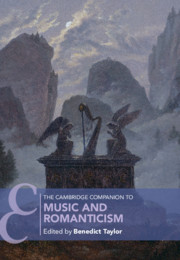Book contents
- The Cambridge Companion to Music and Romanticism
- Cambridge Companions to Music
- The Cambridge Companion to Music and Romanticism
- Copyright page
- Contents
- Figures
- Tables
- Musical Examples
- Contributors
- Preface
- Chronology
- Part I Horizons
- Part II Worlds
- Part III Aesthetics
- Part IV Practices
- 14 Romantic Languages
- 15 Romantic Forms
- 16 Romanticism and the Ideal of Song
- 17 Music Staged and Unstaged
- 18 Romanticism and Performance
- Part V Histories
- Select Bibliography
- Index
- References
15 - Romantic Forms
from Part IV - Practices
Published online by Cambridge University Press: 06 August 2021
- The Cambridge Companion to Music and Romanticism
- Cambridge Companions to Music
- The Cambridge Companion to Music and Romanticism
- Copyright page
- Contents
- Figures
- Tables
- Musical Examples
- Contributors
- Preface
- Chronology
- Part I Horizons
- Part II Worlds
- Part III Aesthetics
- Part IV Practices
- 14 Romantic Languages
- 15 Romantic Forms
- 16 Romanticism and the Ideal of Song
- 17 Music Staged and Unstaged
- 18 Romanticism and Performance
- Part V Histories
- Select Bibliography
- Index
- References
Summary
This chapter offers an introduction to Romantic form, focusing on ways of organising musical forms that were especially prevalent amongst composers working in Germany between 1825 and 1850 but that survived in the music of selected composers until the final years of the century. Using examples drawn from vocal and instrumental works by Felix Mendelssohn, Robert Schumann, Richard Wagner, Clara Schumann, and Antonín Dvořák, it discusses a number of characteristics that are typical of Romantic form as well as the ways they relate to theoretical models that have been developed for classical music. The chapter is organised in two sections. The first addresses matters of formal syntax, that is, the construction and interrelation of musical phrases.The second explores issues of formal incompleteness as well as connections that go beyond the single-movement level.
- Type
- Chapter
- Information
- The Cambridge Companion to Music and Romanticism , pp. 258 - 276Publisher: Cambridge University PressPrint publication year: 2021
References
Further Reading
- 2
- Cited by



